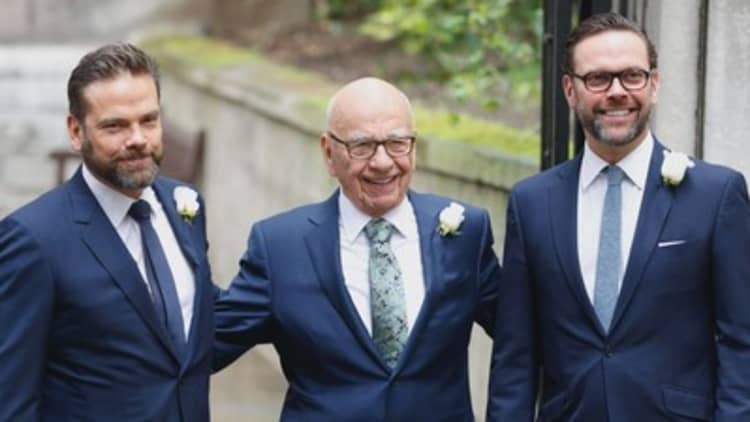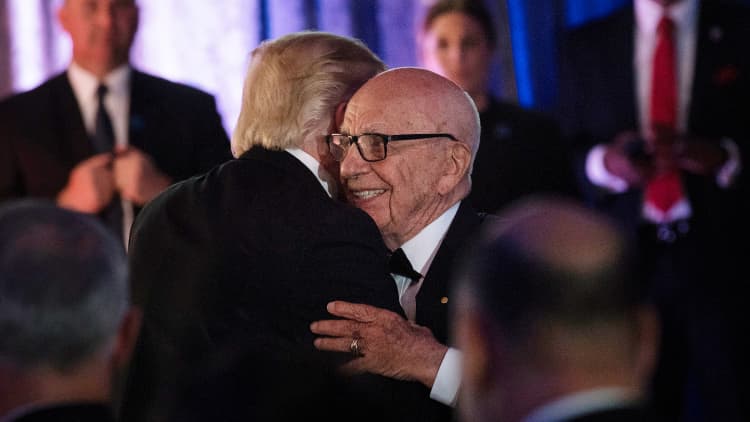
(Disclosure: Affiliates controlled by Eric Jackson have long positions in Disney and Netflix. Comcast is the parent company of NBCUniversal, which owns CNBC.)
Disney's announcement that it is buying major Fox assets for $52.4 billion in stock has generated lots of commentary.
Some opinions about the deal are way off the mark.
Here are the top 5 biggest mistaken conclusions about the deal from my perspective:
- Rupert Murdoch is retreating. Murdoch himself on the Fox call with analysts Thursday morning explicitly said he wasn't retreating. And I believe him. He keeps a good set of assets (dubbed "New Fox") which he will probably take private with News Corp. He keeps the Fox Studios lot real estate with a seven-year lease to Disney. And he might already have an agreement with Bob Iger for his son to join Disney — in which he will retain a 5 percent stake — with a good chance of James Murdoch succeeding Iger in 2021. If so, the Murdoch legacy goes on as the CEO of arguably the world's most admired media brand, worth well over $200 billion. That's no retreat.
- Disney won't be able to do anything to Hulu because of the ownership structure. Rich Greenfield of BTIG has been saying this. The idea is that Hulu was originally set up as an equal-parts owned joint venture between Disney, Fox and Comcast. There might be protections in place so that if one party buys out another party in the joint venture, the minority owner is guaranteed that its content will continue to be shown, and/or share in the profits. Greenfield believes that Comcast might be able to prevent Disney from doing anything with Hulu without its agreement, which might end up frustrating Disney so much that it sells its Hulu stake to Comcast. This seems unlikely to me. Comcast will likely want to continue on in the joint venture as the Hulu service grows, or cash out and do something itself in over-the-top media (avoiding Hulu's ongoing losses). In that case, Disney could simply buy Comcast's (and/or Time Warner's) minority stake.
- Disney is "doubling down" on a failed linear TV business model. When Disney combines with Fox and efficiencies are wrung out, this combined entity will have $25 billion in annual earnings before interest, taxes, depreciation and amortization. If you put a 12x multiple on that business (which is the multiple Disney is paying for the Fox assets) you get a business worth $300 billion. That's 20 percent higher than the current enterprise values of both companies today (including the New Fox assets that aren't going along in the deal). Is some of that EBITDA in danger of going away due to the transition from linear to over the top? Perhaps. However, ESPN and FS1 have shown recently that many of their "lost" subscribers are actually coming back and watching their services through virtual multichannel video programming distributors or other means. And the content that Disney gets will play well in an OTT world and has enormous possibility to be mined as future franchises, as Disney has done with its other key pieces of intellectual property. The Fox regional sports networks have great content that will make the ESPN+ OTT app far more compelling than it will be at launch without that.
- Disney (or Fox) should have waited to sell until there's more regulatory certainty. When would that be? After the Justice Department's trial with AT&T that doesn't start until March? Had Disney waited to buy Fox's assets, Comcast could have swooped in and made an offer. Had Fox waited, its stock price — which was $24 a share before the merger rumors started — could have declined. They could also have been blocked by the U.K. regulator from buying the rest of the Sky assets. Now that deal will likely proceed. There were strong reasons on both sides to do a deal now.
- This deal is a Netflix killer. Those who believe this think that Netflix will be from buying content from Disney or Fox (or their production companies in the future). This, in turn, will make their content offering less compelling for consumers, who will cancel their service. I disagree. I believe Netflix has been preparing for that possibility for years now, which is why they made such a plunge into original content. That content has been remarkably well-received so far. As long as they keep up their pace of producing beloved content, and keep up the regular price increases, they will be able to co-exist in an OTT world with Disney and a few other leading services. I would be much more concerned if I were running HBO.
Commentary by Eric Jackson. Sign up for Eric's monthly Tech & Media Email. You can follow Eric on Twitter @ericjackson.
WATCH: Trump congratulated Murdoch on Disney-Fox deal



